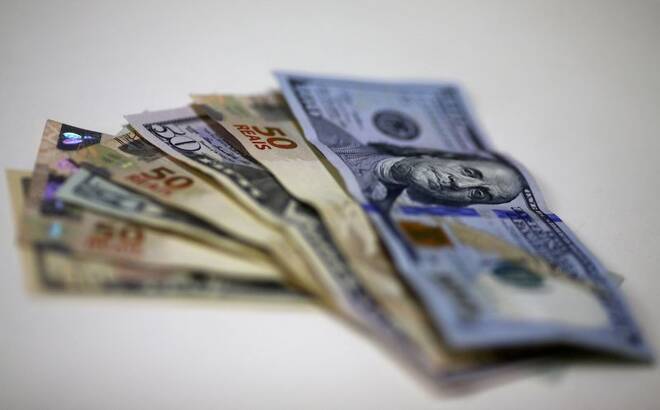Advertisement
Advertisement
Brazil currency trims losses after initial shock from capital riots
By:
By Susan Mathew (Reuters) - Brazil's currency fell on Monday after supporters of former president Jair Bolsonaro stormed the capital, while Chile's peso hit seven-month highs, driven by a leap in copper prices as China's reopened borders drove expectation of higher demand.
By Susan Mathew and Shreyashi Sanyal
(Reuters) -Brazil’s currency fell on Monday but was off its session low after supporters of former President Jair Bolsonaro stormed the capital, while Chile’s peso hit seven-month highs, driven by a leap in copper prices.
Supporters of the far-right Bolsonaro invaded and defaced the country’s Congress, presidential palace and Supreme Court in Brasilia on Sunday and continued protests on Monday, days after the leftist administration under President Luiz Inacio Lula da Silva was sworn-in following a close election win in October.
Brazil’s real snapped a three-day winning run, last down 0.4% after falling over 1% earlier in the day. Stocks reversed declines to rise 0.6%, with shares of state-run oil major Petrobras erased a chunk of its 2% session losses to last trade down 0.2% as oil prices jumped.
Analysts expect the unrest and its impact on markets to be short-lived as authorities try to contain the protests, with the focus soon turning back macroeconomic indicators.
“Because of the swift government response, the market impact has been limited. But the riots could reduce pressure on Lula to present an economic plan in coming weeks and could also slow the reform agenda,” said Elizabeth Johnson, managing director of Brazil research at TS Lombard.
A central bank survey on Monday showed Brazil’s inflation and interest rate expectations for the year had risen.
While most other Latin American currencies also fell, underperforming broader emerging market peers, Chile’s peso rose 0.8% as copper prices hit six-month highs. [MET/L]
Data showed Chile posted a trade surplus of $1.85 billion in the month, up from a $417 million surplus in December 2021.
In Mexico, the peso inched lower, snapping a five-day winning streak and retreating from over one-month highs.
Data showed Mexico’s headline inflation ended 2022 slightly below analysts’ expectations, while core inflation appeared to have lost steam. Annual headline inflation in December reached 7.82%, up moderately from 7.80% in November.
In Argentina, the economy will grow significantly more than 5% in 2023, Economy Minister Sergio Massa said on Sunday.
Key Latin American stock indexes and currencies at 1942 GMT:
Stock indexes Latest Daily %
change
MSCI Emerging Markets 1015.45 2.71
MSCI LatAm 2196.64 0.68
Brazil Bovespa 109614.47 0.6
Mexico IPC 52207.70 0.92
Chile IPSA 5157.00 0.4
Argentina MerVal 215813.64 0.945
Colombia COLCAP 1326.74 0.61
Currencies Latest Daily %
change
Brazil real 5.2568 -0.41
Mexico peso 19.1185 0.03
Chile peso 834.4 0.70
Colombia peso 4848.34 0.22
Peru sol 3.7899 -0.16
Argentina peso (interbank) 180.0900 -0.46
Argentina peso (parallel) 351 0.85
(Reporting by Susan Mathew and Shreyashi Sanyal in Bengaluru; editing by Barbara Lewis and Cynthia Osterman)
About the Author
Reuterscontributor
Reuters, the news and media division of Thomson Reuters, is the world’s largest international multimedia news provider reaching more than one billion people every day. Reuters provides trusted business, financial, national, and international news to professionals via Thomson Reuters desktops, the world's media organizations, and directly to consumers at Reuters.com and via Reuters TV. Learn more about Thomson Reuters products:
Did you find this article useful?
Latest news and analysis
Advertisement
